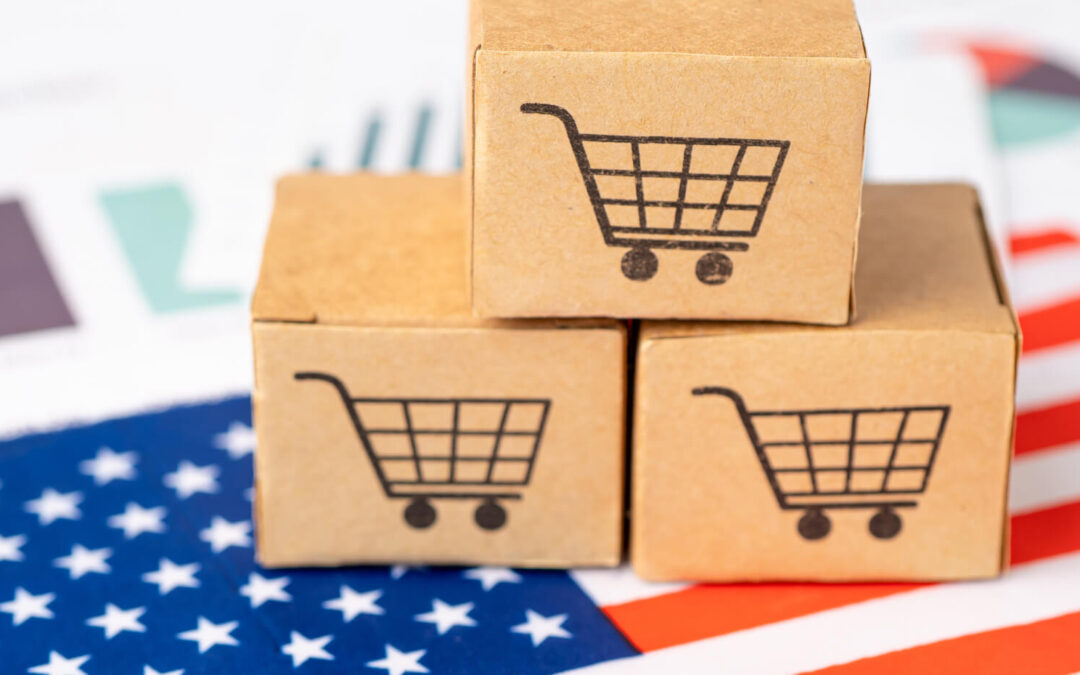Exporting Fast-Moving Consumer Goods (FMCG) presents significant opportunities to American exporters due to rising expanding middle class, urbanization, and evolving consumer preferences all over the world.
However, entering international markets requires a comprehensive understanding of its dynamics, regulatory environment, and consumer behavior.
This FMCG export guide offers a comprehensive overview for exporters alongside actionable strategies for successful exportation.
Read More: 9 Food Manufacturing Certifications Every US Business Should Pursue
3 Key Steps to Create a Successful FMCG Export Strategy
Having a solid export strategy is key to expanding your business internationally. Here’s a breakdown of the main components:
1. Conduct Market Research
Start by identifying your target markets. Look into consumer preferences, market size, and the competition. Resources like the International Trade Administration (ITA) can provide very helpful market insights.
2. Ensure Regulatory Compliance
It’s essential to understand the export regulations in both the U.S. and the countries you’re targeting. The U.S. Department of Agriculture (USDA) offers detailed guidance on how to navigate these regulations. Familiarizing yourself with these regulations helps avoid costly fines, delays, and potential rejections of shipments.
3. Develop a Competitive Pricing Strategy
To stay competitive, you need to consider factors like production costs, tariffs, shipping, and the local market when developing your pricing strategy. Understanding these elements ensures your products are priced effectively for international markets.
Key Tip: Managing Shipping and LogisticsEfficient logistics are a crucial component of successful exporting, ensuring timely deliveries at reasonable costs. Here’s how to manage shipping and logistics effectively:
Freight Forwarders
Freight forwarders are professionals who specialize in managing shipping, customs clearance, and the logistics of international deliveries. Partnering with a reliable freight forwarder will ensure all aspects of your shipping process are handled smoothly, from warehousing and documentation to ensuring compliance with import/export regulations.
Incoterms
Incoterms, or International Commercial Terms, are standardized international shipping terms that define the responsibilities of buyers and sellers in global trade. Familiarizing yourself with the most commonly used Incoterms (e.g., FOB, CIF, EXW) helps set expectations with your international buyers and ensures smooth transactions.

How to Connect with International Buyers?
Reaching international buyers is crucial for growing your business on a global scale. Here’s how you can connect with the right partners:
1. Trade Shows and Missions
Participating in international trade shows and missions offers valuable opportunities to showcase your products, meet potential buyers, and build relationships with key stakeholders in the global market.
These events often attract qualified buyers, industry professionals, and government representatives, providing a platform for networking and business development. The Food Export Association organizes various trade missions and shows that cater to food exporters, making it easier to explore new markets and secure partnerships.
2. B2B Directories and Networks
Many online B2B directories and networks are dedicated to connecting buyers and sellers globally. These platforms allow you to list your products and services, making it easier for international buyers to find you.
These platforms often offer advanced search features that help buyers find suppliers based on specific product categories, industry needs, and geographic locations. Joining these networks can increase your visibility and help you build trust with potential buyers across borders.
3. Network through Trade Associations and Chambers of Commerce
Many trade associations and local chambers of commerce offer networking opportunities that can help you connect with international buyers. These organizations often host events, webinars, and conferences that bring together businesses from different countries.
Becoming a member of relevant industry associations can provide you with access to international trade shows, networking events, and buyer-seller matchmaking programs. These organizations can also provide valuable market intelligence and help you build trust with potential buyers.
4. Engage with Export Promotion Agencies
Export promotion agencies, such as the U.S. Commercial Service or regional export councils, are valuable resources for connecting with international buyers. These agencies often offer programs designed to match exporters with qualified foreign buyers.
They may also assist with trade missions, international matchmaking services, and market research to help you identify the best opportunities. Working with an export promotion agency can provide you with the support and guidance needed to connect with the right buyers in foreign markets.
5. Online Marketplaces
E-commerce platforms allow businesses to showcase their products to international buyers. Using online marketplaces can help you expand your visibility and tap into new customer segments worldwide.
The International Trade Administration (ITA) offers resources on how to develop digital strategies, optimize your online presence, and engage with international customers.
Key Tip: How to Ensure Payment Security for ExportsInternational transactions carry inherent risks, but there are ways to protect your business and ensure payment security:
Letters of Credit
A letter of credit is a financial document issued by a bank that guarantees payment to the seller once certain conditions are met. This method is commonly used in international trade to reduce the risk of non-payment.
Credit Insurance
Credit insurance helps protect your business against the risk of non-payment by international buyers. This type of insurance covers you in case a buyer fails to make payment due to bankruptcy, insolvency, or other reasons. By purchasing credit insurance, you can safeguard your cash flow and reduce the financial risks associated with international transactions.
5 Useful Tips for U.S FMCG Exporters
Here are 5 actionable tips for U.S exporters
Market Research: Conduct thorough research to understand consumer preferences and regional market dynamics.
Regulatory Compliance: Ensure all products meet Indonesian regulatory standards, including halal certification and labeling requirements.
Local Partnerships: Collaborate with local distributors and agents to navigate the market effectively.
Digital Presence: Leverage e-commerce platforms and digital marketing to reach a broader audience.
Adaptation: Be prepared to adapt products to meet local tastes and preferences, such as offering smaller package sizes or developing halal-certified versions.
Halal Certification and Its Importance in FMCG Export
Halal certification plays a pivotal role in the export of Fast-Moving Consumer Goods (FMCG) to international markets, particularly in countries with significant Muslim populations.
1. Access to New Markets
Halal certification allows FMCG companies to tap into a large, global consumer base. In countries with significant Muslim populations, halal certification is often required for food, beverages, cosmetics, and pharmaceuticals. Halal-certified products are also increasingly popular in non-Muslim countries due to growing awareness of halal’s safety and quality standards.
You Might Also Like: Halal Certification for Export to UAE, Saudi Arabia, and GCC/MENA Countries
2. Building Consumer Trust
Consumers prefer halal-certified products because they provide assurance that the items meet ethical, religious, and safety standards. For FMCG companies, halal certification serves as a sign of quality and reliability, which is particularly important in food safety and ethical sourcing. It can help build consumer loyalty and establish trust within diverse markets.
3. Compliance with Regulatory Requirements
Many countries, especially in the Middle East, Southeast Asia, and parts of Africa, require halal certification for the import and sale of FMCG products.
Additionally, halal certification can help your products meet the requirements set by trade agreements, including Free Trade Agreements (FTAs) between countries that prioritize halal trade.
Check Out: Canada-Indonesia Trade Deal Boosting Halal-Certified Exports
Get in Touch With AHF
If you are looking to acquire halal certification for FMCG exports, get in touch with the American Halal Foundation (AHF).
Our team offers expert guidance on how to engage with international markets, ensuring that your products meet the necessary certification requirements for entry into global markets.
Call an AHF expert at +1 (630) 759-4981 or simply send us a mail at info@halalfoundation.org to learn more!
Frequently Asked Questions (FAQs)
Q1. What U.S governmental programs can I leverage to export internationally?
Several U.S. government agencies offer programs to support exporters:
- Export-Import Bank of the United States (EXIM): Provides financial assistance and insurance to mitigate the risks associated with international trade.
- Food Export Association: Offers educational programs, market entry services, and financial assistance to U.S. food and agricultural exporters.
Q2. What is the role of halal certification in international business?
Halal certification is crucial for accessing markets that demand halal products. It assures consumers that your products meet Islamic dietary laws, making them more appealing to buyers in Muslim-majority countries. AHF provides globally recognized halal certification to help you expand your reach.
Q3. How do I start FMCG exports from the USA?
Starting FMCG exports from the USA involves researching target markets, understanding local regulations, ensuring product compliance with international standards (such as halal certification), and partnering with experienced freight forwarders for shipping.
Q4. How can I find international buyers for FMCG products?
You can connect with international buyers by attending trade shows, participating in online marketplaces, leveraging export promotion agencies, and joining industry-specific trade associations. Networking and digital marketing are also effective strategies for reaching global buyers.
Q5. How do tariffs affect FMCG exports?
Tariffs are taxes imposed by governments on imported goods. These can affect the pricing and competitiveness of FMCG products in foreign markets. It’s important to stay informed about applicable tariffs and trade agreements to optimize export costs.
Q6. What are the benefits of exporting FMCG products globally?
Exporting FMCG products helps businesses tap into new markets, build brand recognition, diversify revenue streams, and increase competitiveness. It also allows companies to leverage growing demand in emerging markets and expand their global footprint.
Azmi is a dynamic content and client development professional at the American Halal Foundation, blending his passion for the halal lifestyle, history, and travel with sharp market insights. Known for his attention to detail and strategic approach, he crafts impactful content that drives engagement and strengthens AHF’s connection with global audiences.




